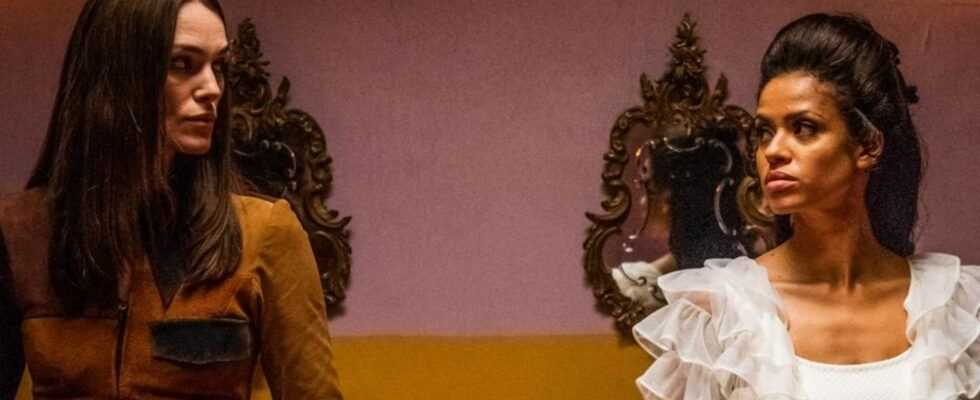Keira Knightley played several characters who suffer from traditional images of women. In "Die Misswahl" she actively fights against it.
In "Pirates of the Caribbean" she mutates from the cared for governor's daughter to a courageous pirate, as Elizabeth Bennet she wants to marry in "Pride and Prejudice" for love only, and in "Colette" she fights for recognition as a true author of bestselling novels. Keira Knightley (35) is no stranger to roles with feminist traits. In her new film "The Miss Vote – The Beginning of a Revolution", which is based on a true story, she and her fellow campaigners are finally fed up with it. Together they finally want to shake the world awake.
A beauty contest targeted by rebellious women: that's what it's about
Sally Alexander (Knightley) has had enough of being constantly disadvantaged as a woman. In particular, the annual "Miss World" election stands for the divorced mother and academic who is studying history in her second degree, symbolic of an outdated image of women. After a chance encounter with the rebellious 68er Jo Robinson (Jessie Buckley), she wants to draw the public's attention in London in 1970 to the grievances in society and becomes part of the "Women's Liberation Movement".
While the black outsider candidates Miss Grenada (Gugu Mbatha-Raw) and Miss Africa South (Loreece Harrison) and their competitors practice posing in bathing suits, the revolutionary women's movement around Sally and Jo is forging a sabotage plan. In the end, not only they, but also the winner of the beauty contest provide real surprises.
Figures cannot unfold
Director Philippa Lowthorpe (58, "The Other Boleyn Girl") faced two major challenges when she signed for "Die Misswahl". On the one hand, it had to accommodate a true and extremely multi-faceted story in just under 106 minutes of film length. The British woman succeeded in doing this, but her characters lack the necessary depth. The viewers don't learn much about the past of Keira Knightley's central figure Sally Alexander, who as a woman is not taken seriously by her male professors and fellow students.
Miss Grenada Jennifer Hosten comes off even worse, whose characterization is almost exclusively limited to her skin color and geographical origin. Actress Gugu Mbatha-Raw (37, "The Time Puzzle") ensures the best moment of the film with her powerful portrayal. In it, behind the scenes of the "Miss World" television broadcast in the Royal Albert Hall, she unexpectedly meets Sally Alexander, who is equally outstandingly played by Knightley, in the bathroom.
Fight against sexism vs. Fight against racism
The two characters appear opposite in every respect and fight against different dimensions of inequality. While the white Sally Alexander is mischievously and rebelliously calling for gender equality, Jennifer Hosten seeks basic inclusion and acceptance through conformity and adjustment. One rebels against the existing system, the other fights for the right to be accepted in it at all. Both women are united by a common goal: breaking up outdated structures.
Filmmaker Lowthorpe faced the second major challenge with the sensitive presentation of the different ambitions and methods used. Miss Grenada's fight against racism could have made that of Sally Alexander, who is privileged in direct comparison, seem slightly insignificant and a lot simpler. "The Miss Wahl" manages to give both fights a similarly high priority. It is therefore all the more regrettable that there is not enough time to tell the individual life stories.
"Other girls are happy that way too"
Perhaps it would have been advisable to give other characters less space. For example, the US entertainer Bob Hope, played by the almost unrecognizable Greg Kinnear (57, "Little Miss Sunshine"). He portrays the sexist moderator of the beauty pageant, who looks after every skirt, passably, but the plot would have done well without him. Hopes wife Dolores also seems comparatively unimportant, although she sarcastically comments on her husband's antics and missteps, but ultimately accepts them.
Together with Sally Alexander's mother Evelyn (Phyllis Logan), she symbolizes an older generation of women who quietly submit to their fate and who have little understanding for the rebellion of their daughters. "Other girls are so happy too," Sally Alexander hears from her mother's mouth, whereupon she cheekily counters: "Well, I'm not a girl, I'm a woman." The generation conflict is another interesting topic that the film mentions in passing, but which the feature film format does not offer enough space for.
Well worth seeing thanks to current topics and a strong cast
Despite its obvious weaknesses, "The Miss Vote – The Beginning of a Revolution" is well worth seeing. This is not least due to a strong cast – a positive mention here is Jessie Buckley (30, "Judy") as cheeky Jo Robinson – and a topic that is part of the "#MeToo" and "Black Lives Matter" movements in 2020 could hardly be more topical. In addition, the film retrospectively pays tribute to the courage of the real Sally Alexander and her colleagues. The end of the film shows their faces, the inspiring story is now known to a wider public 50 years after the "Miss World" election in 1970.
Keira Knightley seems to be getting a little closer with her leading role in Philippa Lowthorpe's work. She and her character Sally Alexander both quarrel with the norms of society and break out of them. Knightley recently told Bild am Sonntag that she had tried in the past to "fit in and be perfect as best she could". Today the 35-year-old also sees herself as a feminist. This is probably why she seems so wonderfully authentic in her role.
